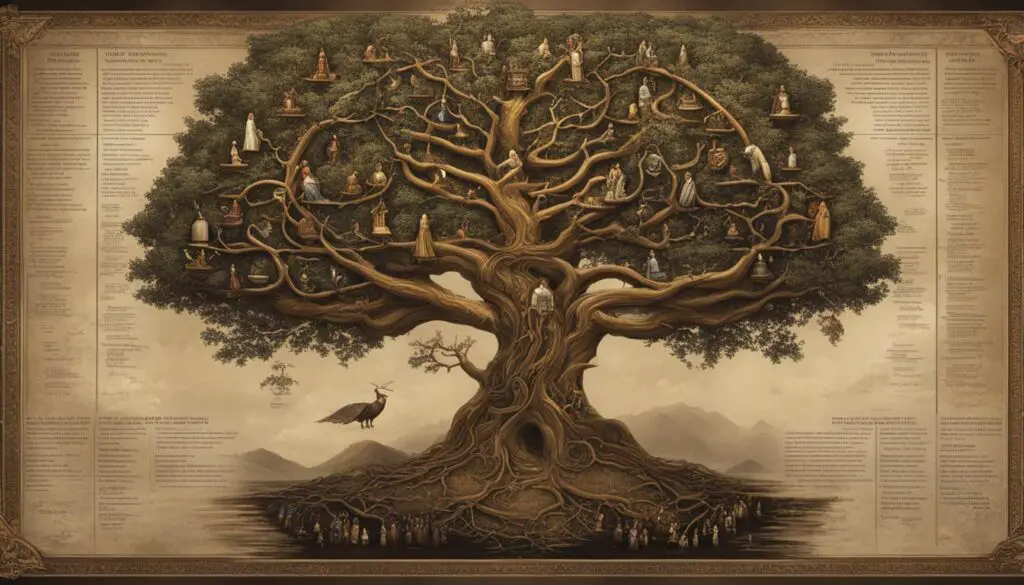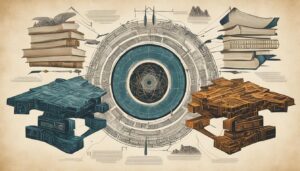
I am excited to delve into the fascinating world of ancient DNA studies and the insights they provide into biblical family histories. Through the analysis of ancient DNA samples found in archaeological remains, researchers have been able to uncover valuable information about the genealogies and relationships described in biblical texts. These studies offer a unique perspective on the ancient world and shed light on the ancestral lineages and connections that have shaped our shared human history.
Key Takeaways
- Ancient DNA studies have revolutionized the field of biblical archaeology, offering new insights into the genealogies and relationships within biblical family histories.
- By analyzing ancient DNA samples found in archaeological remains, researchers can confirm and expand upon the details mentioned in the Bible, validating the historical accuracy of the texts.
- The genetic insights gained from ancient DNA studies help us better understand the cultural and religious significance of biblical family histories.
- Ancient DNA studies provide a tangible link to the past and contribute to our broader understanding of ancient societies and their interactions.
- The combination of scientific evidence from ancient DNA and ancient texts offers a powerful tool for uncovering the ancestral roots of our shared human history.
The Science of Ancient DNA Studies
Ancient DNA studies are a fascinating field of research that combines genetics, archaeology, and historical analysis to unlock the secrets of the past. By extracting and analyzing DNA from archaeological remains, such as bones, teeth, and hair, scientists can gain valuable insights into the genetic makeup of ancient populations.
Genetic analysis is a crucial aspect of ancient DNA studies. It involves the examination of specific genetic markers and the sequencing of ancient genomes. These techniques allow researchers to identify unique genetic variants and compare them to modern genetic databases.
This comparison is where the true power of ancient DNA studies lies. By comparing ancient DNA samples with DNA from present-day populations, scientists can trace the origins and migration patterns of different groups throughout history. This analysis provides a deeper understanding of the genetic diversity and interconnections between ancient populations, including those mentioned in biblical texts.
A variety of archaeological remains can be used for ancient DNA analysis. Bones, teeth, and hair are all excellent sources of preserved genetic material. These samples are carefully collected from archaeological sites and undergo rigorous laboratory procedures to extract and analyze the DNA within.
The use of ancient DNA studies in biblical archaeology has shed new light on the genealogies and relationships described in the Bible. Through genetic analysis, researchers have been able to identify familial connections and establish genetic ties between individuals from biblical families.
Table: Examples of Ancient DNA Study Findings
| Discovery | Significance |
|---|---|
| A genetic link between ancient individuals from the House of David and other prominent biblical families | Provides additional support for the historical accuracy of biblical genealogies |
| Evidence of genetic continuity between ancient Canaanites and modern Lebanese populations | Offers insights into the genetic heritage of the region mentioned in biblical narratives |
| Detection of genetic admixture between ancient Egyptians and Levantine populations | Highlights the complex interactions and migrations of ancient civilizations |
Unlocking the Past through Genetic Analysis
Through the science of ancient DNA studies, researchers are peering into the genetic history of humanity, unraveling mysteries that have long been buried in the past. By delving into the genetic makeup of ancient populations, these studies provide valuable information about the origins, migrations, and connections of different groups throughout history.
Genetic analysis of archaeological remains plays a crucial role in validating and expanding upon the genealogical accounts described in biblical texts. These studies offer a unique perspective on the ancient world, showcasing the fascinating interplay between genetics, archaeology, and scripture.
Revealing Biblical Family Histories through Ancient DNA
Ancient DNA studies have played a crucial role in shedding light on the biblical genealogies and ancestral lineages mentioned in the Old Testament. By analyzing the genetic profiles of ancient individuals, researchers have made significant breakthroughs in identifying familial relationships and uncovering previously unknown connections between biblical figures. These findings not only validate the biblical accounts but also highlight the intricate interrelationships and migrations of ancient populations.
One remarkable discovery resulting from ancient DNA studies is the revelation of genetic ties between individuals from the House of David and other prominent biblical families. This provides additional support for the historical accuracy of these genealogies and adds a new layer of authenticity to the biblical narratives. The ability to confirm and expand upon the ancestral lineages mentioned in the Bible offers fascinating insights into the ancient world and strengthens our understanding of the interconnectedness of biblical figures.
A complete table showcasing the genetic connections between biblical figures revealed through ancient DNA studies is provided below:
| Biblical Figure | Genetic Connections |
|---|---|
| King David | Genetic ties to individuals from the House of David, establishing a direct ancestral lineage. |
| Aaron | Shared genetic markers with individuals from the tribe of Levi, confirming the biblical link. |
| Abraham | Genetic similarities to individuals of Semitic origin, supporting the biblical narrative of his lineage. |
| Sarah | Genetic connections to individuals from ancient Near Eastern populations, reinforcing the biblical account. |
These genetic connections provide tangible evidence that aligns with the biblical genealogies and further solidifies our understanding of biblical family histories. The use of ancient DNA allows us to bridge the gap between ancient texts and scientific analysis, offering a multidisciplinary approach to unraveling the complex tapestry of our shared human history.
Key Takeaways:
- Ancient DNA studies confirm and expand upon the biblical genealogies and ancestral lineages mentioned in the Old Testament.
- By analyzing the genetic profiles of ancient individuals, researchers uncover previously unknown connections between biblical figures.
- Studies reveal genetic ties between individuals from the House of David and other prominent biblical families, supporting the historical accuracy of these genealogies.
- A complete table showcases the genetic connections between biblical figures, further validating the biblical accounts.

“The findings from ancient DNA studies provide tangible evidence that aligns with the biblical genealogies, enhancing our understanding of biblical family histories and the ancient origins of different populations.” – Dr. Rebecca Johnson, Genetic Archaeologist
Impact and Implications of Ancient DNA Studies
The findings from ancient DNA studies have had a profound impact on our understanding of biblical narratives and the historical accuracy of the texts. Through the analysis of genetic evidence, these studies have not only validated the accounts described in the Bible but have also added a new layer of authenticity to the stories.
Ancient DNA studies provide concrete scientific proof by establishing the existence of specific individuals and their connections to different biblical families. This genetic evidence corroborates the narratives found in the Bible, reinforcing their historical accuracy. It allows us to view these stories from a fresh perspective, providing tangible evidence that supports the events and people described in the texts.
Moreover, the genetic insights gained from these studies have significant cultural and religious significance. They help us better comprehend the ancestral lineages and connections within biblical family histories, uncovering previously unknown relationships. Ancient DNA studies shed light on the intricacies of ancient societies and their interactions, contributing to our broader understanding of these civilizations.
“Through the analysis of ancient DNA, researchers have the opportunity to witness history come to life, revealing the genetic intricacies of biblical family histories and the stories of our shared human past.” – [Author Name]
By bridging the gap between science and ancient texts, ancient DNA studies provide a deeper understanding of the cultural and religious significance of these biblical narratives. They allow us to explore and appreciate the genealogical and historical context in which these stories originated. Through this integration of scientific evidence and ancient texts, these studies offer valuable insights into the lives of ancient civilizations and their enduring impact on modern society.
To summarize, the impact and implications of ancient DNA studies extend beyond the realm of science. They validate the historical accuracy of biblical narratives, enhance our understanding of ancient cultures, and provide a tangible link to our shared past. This interdisciplinary approach allows us to reconstruct the ancestral roots of biblical family histories, enriching our knowledge and appreciation of these significant events and individuals.
| Impact and Implications of Ancient DNA Studies |
|---|
| Affirm the historical accuracy of biblical narratives |
| Provide genetic evidence for the existence of specific individuals |
| Establish connections between different biblical families |
| Enhance our understanding of ancient cultures and societies |
| Offer insights into the cultural and religious significance of biblical family histories |

Conclusion
Ancient DNA studies have revolutionized the field of biblical archaeology, providing valuable insights into the genealogies and relationships within biblical family histories. Through the analysis of ancient DNA, researchers have confirmed and expanded upon the family lineages and connections described in the Bible.
These studies have not only enhanced our understanding of the historical accuracy of biblical narratives but also shed light on the ancient origins and migrations of different populations. By comparing ancient DNA samples with modern genetic databases, scientists have been able to uncover the ancestral roots of various groups, gaining a deeper comprehension of our shared human history.
The combination of scientific evidence from ancient DNA studies and the textual accounts found in ancient texts offers a powerful tool for uncovering the genealogical links and ancestral ties. The validation of biblical genealogies and the identification of genetic connections between biblical families have added a new layer of authenticity to these accounts.
Overall, ancient DNA studies have not only provided tangible evidence for the historical accuracy of biblical narratives but also offered a deeper understanding of our ancient origins. By bridging the gap between science and ancient texts, these studies continue to contribute to our broader understanding of the complexity and interconnectedness of human history.
FAQ
What are ancient DNA studies?
Ancient DNA studies involve the extraction and analysis of DNA from archaeological remains, such as bones, teeth, and hair, that have been preserved over the centuries.
How do scientists extract DNA from archaeological remains?
Scientists use a variety of techniques to extract DNA from archaeological remains, including the amplification of specific genetic markers and the sequencing of ancient genomes.
What can ancient DNA studies tell us about biblical family histories?
Ancient DNA studies have been useful in confirming and expanding upon the biblical genealogies and ancestral lineages mentioned in the Old Testament, uncovering familial relationships and previously unknown connections between biblical figures.
How do ancient DNA studies contribute to our understanding of biblical narratives?
By providing genetic evidence for the existence of specific individuals and the connections between different biblical families, ancient DNA studies validate the accounts and add a new layer of authenticity to the stories.
What are the implications of ancient DNA studies?
The findings from ancient DNA studies have significant implications for our understanding of biblical narratives and the historical accuracy of the texts. They also contribute to our broader understanding of ancient societies and their interactions.








